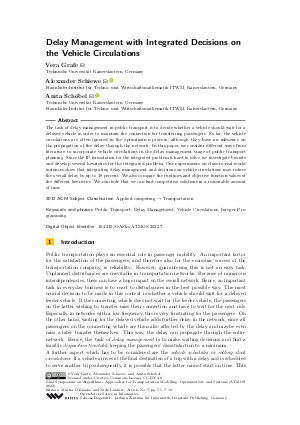Delay Management with Integrated Decisions on the Vehicle Circulations
Authors
Vera Grafe,
Alexander Schiewe  ,
Anita Schöbel
,
Anita Schöbel 
-
Part of:
Volume:
22nd Symposium on Algorithmic Approaches for Transportation Modelling, Optimization, and Systems (ATMOS 2022)
Part of: Series: Open Access Series in Informatics (OASIcs)
Part of: Conference: Symposium on Algorithmic Approaches for Transportation Modelling, Optimization, and Systems (ATMOS) - License:
 Creative Commons Attribution 4.0 International license
Creative Commons Attribution 4.0 International license
- Publication Date: 2022-09-06
File

PDF
OASIcs.ATMOS.2022.7.pdf
- Filesize: 0.77 MB
- 18 pages
Document Identifiers
Subject Classification
ACM Subject Classification
- Applied computing → Transportation
Keywords
- Public Transport
- Delay Management
- Vehicle Circulations
- Integer Programming
Metrics
- Access Statistics
-
Total Accesses (updated on a weekly basis)
0Document
0Metadata
Abstract
The task of delay management in public transport is to decide whether a vehicle should wait for a delayed vehicle in order to maintain the connection for transferring passengers. So far, the vehicle circulations are often ignored in the optimization process, although they have an influence on the propagation of the delay through the network. In this paper we consider different ways from literature to incorporate vehicle circulations in the delay management stage of public transport planning. Since the IP formulation for the integrated problem is hard to solve, we investigate bounds and develop several heuristics for the integrated problem. Our experiments on close-to real-world instances show that integrating delay management and decisions on vehicle circulations may reduce the overall delay by up to 39 percent. We also compare the runtimes and objective function values of the different heuristics. We conclude that we can find competitive solutions in a reasonable amount of time.
Cite As Get BibTex
Vera Grafe, Alexander Schiewe, and Anita Schöbel. Delay Management with Integrated Decisions on the Vehicle Circulations. In 22nd Symposium on Algorithmic Approaches for Transportation Modelling, Optimization, and Systems (ATMOS 2022). Open Access Series in Informatics (OASIcs), Volume 106, pp. 7:1-7:18, Schloss Dagstuhl – Leibniz-Zentrum für Informatik (2022)
https://doi.org/10.4230/OASIcs.ATMOS.2022.7
BibTex
@InProceedings{grafe_et_al:OASIcs.ATMOS.2022.7,
author = {Grafe, Vera and Schiewe, Alexander and Sch\"{o}bel, Anita},
title = {{Delay Management with Integrated Decisions on the Vehicle Circulations}},
booktitle = {22nd Symposium on Algorithmic Approaches for Transportation Modelling, Optimization, and Systems (ATMOS 2022)},
pages = {7:1--7:18},
series = {Open Access Series in Informatics (OASIcs)},
ISBN = {978-3-95977-259-4},
ISSN = {2190-6807},
year = {2022},
volume = {106},
editor = {D'Emidio, Mattia and Lindner, Niels},
publisher = {Schloss Dagstuhl -- Leibniz-Zentrum f{\"u}r Informatik},
address = {Dagstuhl, Germany},
URL = {https://drops.dagstuhl.de/entities/document/10.4230/OASIcs.ATMOS.2022.7},
URN = {urn:nbn:de:0030-drops-171119},
doi = {10.4230/OASIcs.ATMOS.2022.7},
annote = {Keywords: Public Transport, Delay Management, Vehicle Circulations, Integer Programming}
}
Author Details
- Fraunhofer-Institut für Techno- und Wirtschaftsmathematik ITWM, Kaiserslautern, Germany
References
-
Stefan Bunte and Natalia Kliewer. An overview on vehicle scheduling models. Public Transport, 1:299-317, 2009.

-
Twan Dollevoet, Francesco Corman, Andrea D'Ariano, and Dennis Huisman. An iterative optimization framework for delay management and train scheduling. Flexible Services and Manufacturing Journal, 26:490-515, 2012.

-
Twan Dollevoet and Dennis Huisman. Fast heuristics for delay management with passenger rerouting. Public Transport, 6:67-84, 2011.

-
Twan Dollevoet, Dennis Huisman, Leo Kroon, Marie Schmidt, and Anita Schöbel. Delay management including capacities of stations. Transportation Science, 49(2):185-203, 2015.

-
Twan Dollevoet, Dennis Huisman, Leo Kroon, Lucas Veelenturf, and Joris Wagenaar. Application of an iterative framework for real-time railway rescheduling. Computers & Operations Research, 78:203-217, 2017.

-
Twan Dollevoet, Dennis Huisman, Marie Schmidt, and Anita Schöbel. Delay management with rerouting of passengers. Transportation Science, 46(1):74-89, 2012.

-
Twan Dollevoet, Dennis Huisman, Marie Schmidt, and Anita Schöbel. Delay Propagation and Delay Management in Transportation Networks, pages 285-317. Springer, 2018.

-
Holger Flier, Marc Nunkesser, Michael Schachtebeck, and Anita Schöbel. Integrating rolling stock circulation into the delay management problem. NAM preprint series, Georg-August-Universität Göttingen, 2007.

-
Vera Grafe. Delay management with integrated vehicle scheduling: Analysis and algorithms. Master’s thesis, Technische Universität Kaiserslautern, 2020.

- Gurobi Optimization, LLC. Gurobi optimizer reference manual, 2020. URL: http://www.gurobi.com.
-
Rowan Hoogervorst, Twan Dollevoet, Gábor Maróti, and Dennis Huisman. Reducing passenger delays by rolling stock rescheduling. Transportation Science, 54(3):762-784, 2020.

-
Eva König. A review on railway delay management. Public Transport, 12:335-361, 2020.

-
Richard M. Lusby, Jesper Larsen, and Simon Bull. A survey on robustness in railway planning. European Journal of Operational Research, 266:1-15, 2018.

-
Ralf Rückert, Martin Lemnian, Christoph Blendinger, Steffen Rechner, and Matthias Müller-Hannemann. Panda: A software tool for improved train dispatching with focus on passenger flows. Public Transport, 9:307-324, 2017.

-
Michael Schachtebeck. Delay Management in Public Transportation: Capacities, Robustness, and Integration. PhD thesis, Georg-August-Universität Göttingen, 2009.

-
Michael Schachtebeck and Anita Schöbel. To wait or not to wait and who goes first? delay management with priority decisions. Transportation Science, 44:307-321, 2010.

-
Alexander Schiewe, Sebastian Albert, Vera Grafe, Philine Schiewe, Alexander Schöbel, and Felix Spühler. LinTim - Integrated Optimization in Public Transportation. Homepage. https://www.lintim.net/. open source.

- Alexander Schiewe, Sebastian Albert, Vera Grafe, Philine Schiewe, Anita Schöbel, and Felix Spühler. LinTim: An integrated environment for mathematical public transport optimization. Documentation for version 2021.12. Technical report, Fraunhofer-Institut für Techno- und Wirtschaftsmathematik, 2021. URL: https://nbn-resolving.org/urn:nbn:de:hbz:386-kluedo-66870.
- Philine Schiewe. Integrated Optimization in Public Transport Planning, volume 160 of Optimization and Its Applications. Springer, 2020. URL: https://doi.org/10.1007/978-3-030-46270-3.
-
Philine Schiewe and Anita Schöbel. Periodic timetabling with integrated routing: Towards applicable approaches. Transportation Science, 54(6):1714-1731, 2020.

-
Philine Schiewe and Anita Schöbel. Integrated optimization of sequential processes: General analysis and application to public transport. Technical report, TU Kaiserslautern, 2021. submitted for publication.

-
Anita Schöbel. A model for the delay management problem based on mixed-integer-programming. Electronic Notes in Theoretical Computer Science, 50(1):1-10, 2001.

-
Anita Schöbel. Integer programming approaches for solving the delay management problem. In Algorithmic Methods for Railway Optimization, volume 4359 of Lecture Notes in Computer Science, pages 145-170. Springer, 2007.

